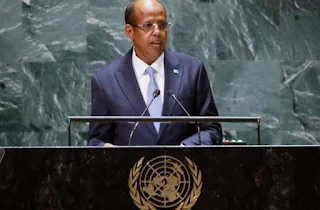The Quest for Equitable Global Finance:
Djibouti's Minister of Foreign Affairs, Mahmoud Ali Youssouf, underscored the urgent need to reform the international financial system. He argued that the existing framework often compels developing nations to resort to costly loans, leading to unsustainable public debts and hindering investments in critical areas such as the United Nations' Sustainable Development Goals (SDGs). Youssouf emphasized that inclusive multilateralism is essential for restoring trust in the United Nations among member states.
Djibouti's Financial Distress:
According to a Debt Sustainability Analysis (DSA), Djibouti was among the 22 African countries classified as "in financial distress" by the World Bank in 2022. This was primarily due to inadequate debt management and a significant and unexpected increase in public debt over five years. Djibouti even had to defer a debt payment of nearly $1.4 billion to China earlier in the year. Nevertheless, Youssouf remains optimistic about the country's progress toward achieving sustainable development goals, including maintaining a manageable public debt ceiling.
Djibouti's Commitment to SDGs:
Djibouti has incorporated the United Nations' Sustainable Development Goals (SDGs) into its national development plans, including the Djibouti Vision 2035. However, there are challenges in collecting data for specific SDGs, such as clean water and sanitation (SDG 6) and access to energy (SDG 7). These challenges are not unique to Djibouti and are shared by several African nations.
African Unity for Financial Equity:
Djibouti's call for a fairer financial system resonates with other African nations, including Kenya. President William Ruto of Kenya also emphasized the need for an equitable financial trading system to reduce the risk of default among developing countries during the Africa Climate Summit.
Djibouti's Renewable Energy Milestone:
Despite financial challenges, Djibouti recently inaugurated the Ghoubet Wind Power Station, a renewable energy project costing $122 million. This station is expected to generate approximately 60 megawatts of electricity, a significant step towards sustainable development.
The Port Controversy:
Djibouti's strategic location has granted it one of the world's busiest seaports. However, the country has faced challenges in reaping the benefits of this asset. A legal dispute with DP World, a global port operator, has further complicated the nation's financial stability.
Allegations Against the President:
Allegations of diverting port income into personal accounts and engaging in illicit activities with foreign security organizations have added to Djibouti's challenges. The seizure of assets worth $2.3 billion belonging to the ruling family by South African authorities has fueled these allegations.
Ethiopia's Port Diversification:
Ethiopia, a major player in Djibouti's port industry, is exploring alternative routes to diversify its access to ports, reflecting the government's 30-year integrated transport master plan. This move aims to reduce dependence on Djibouti's main seaport.
Djibouti faces a complex landscape of financial challenges, legal disputes, and regional hostilities. While advocating for a fairer global financial system and sustainable development, Djibouti must address its internal issues to fully benefit from international reforms. The path to financial stability and global influence demands a balanced approach to both domestic and international concerns.





Comments
Post a Comment